Chinese kids to undergo nine years of culinary training: Parents are worried
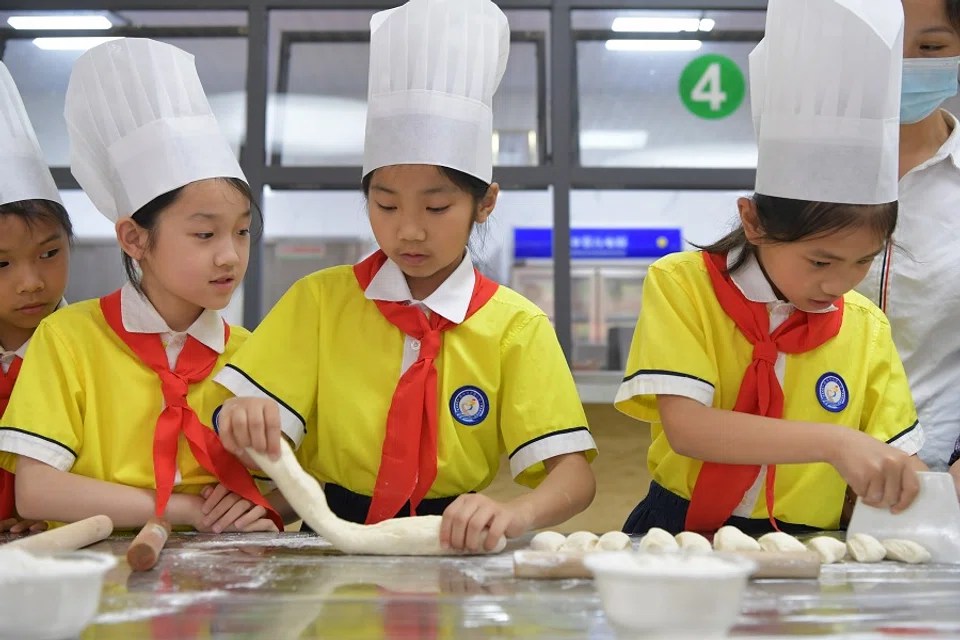
Primary and secondary school students in China do not have it easy - on top of dealing with competition and heavy workloads, they will now have to take cooking lessons.
And it will not be simple lessons in cooking instant noodles or rice. A Ministry of Education (MOE) document states that by the end of a student's nine-year compulsory education, he/she should have mastered various cooking methods such as steaming, boiling, stir-frying, pan-frying and simmering. With three to four dishes at their fingertips, they should be able to craft daily meal plans featuring three recipes with a good grasp of nutritional balance, the science of eating and Chinese food culture. These are knowledge that even homemakers may not be aware of!
The news drew much attention on Chinese social media in early May, with "education ministry wants primary and secondary school students to learn cooking from September" becoming Weibo's top trending topic. As of 19 May, this topic has garnered 870 million views.
Some parents have welcomed the change and are glad that their children will learn some life skills. Other parents on the other hand are unhappy about being forced to participate and the added burden. All sorts of concerns are swirling on the Chinese internet.
Compulsory labour classes
Based on information from the MOE website, guancha.cn and Xinhuanet, labour classes will be part of a separate curriculum in primary and secondary schools starting from the fall semester this September, as stated in the MOE document "Compulsory Education Curriculum Programme" (《义务教育课程方案》).
The weekly labour classes will focus on practical hands-on exercises, resilience training and cultivating good labour values and qualities. The curriculum is divided into the three main sections of domestic, productive and service labour, which will be further divided into ten task groups.
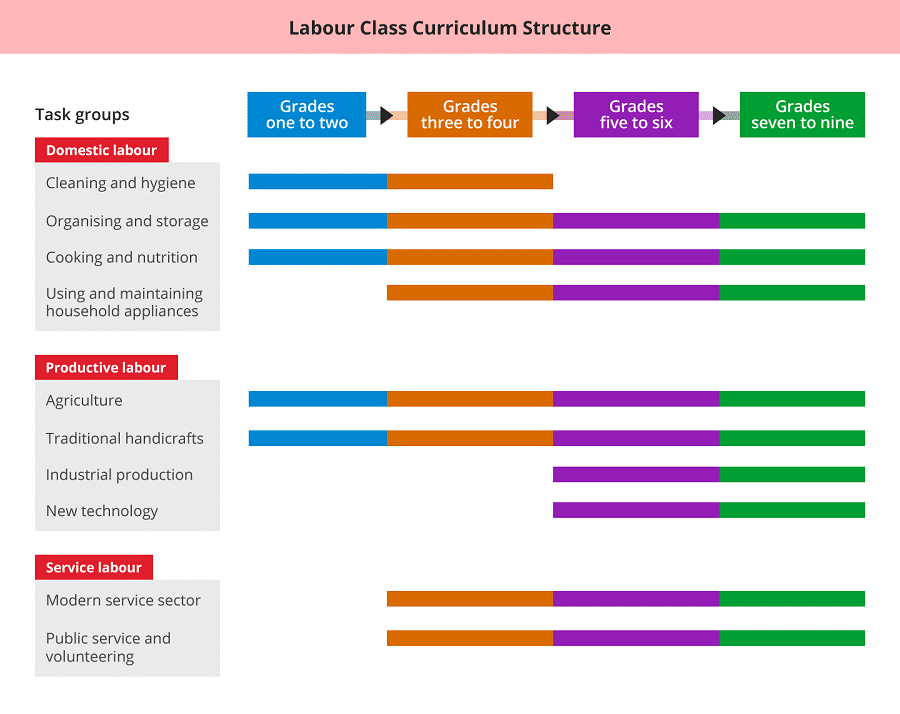
Among them, classes in four task groups will continue throughout the nine years of compulsory education: "organising and storage" and "cooking and nutrition" under the domestic labour category, and "agriculture" and "traditional handicrafts" under the productive labour category.
We will take a closer look at the specific requirements of the "cooking and nutrition" task group, which parents are most worried about.
Nine years of culinary training
Based on the curriculum requirements, first and second graders will learn simple cooking and food preparation skills such as choosing and washing vegetables, and selecting the right utensils for preparing simple food and drinks. They will gain a preliminary understanding of nutrition as well as the science of eating.
Third and fourth graders are expected to know how to use simple kitchen utensils to cut ingredients and make cold dishes and assorted platters. They will learn to steam and boil food; use oil, soy sauce and vinegar to make a cucumber salad; heat up pastries; and boil eggs and dumplings.
Fifth and sixth graders are required to use simple cooking methods such as stir-frying, pan-frying and simmering to prepare two to three common dishes, such as scrambled egg with tomatoes and spare rib soups. They are expected to complete the whole food preparation process by themselves, from choosing, washing and cooking to plating the dish. They are also expected to design nutritious recipes according to the needs of their family.
While students are not expected to prepare mouthwatering dishes, objectively speaking, it is no mean feat to prepare three to four nutritious meals and understand the science of eating as well as food culture as a young teenager.
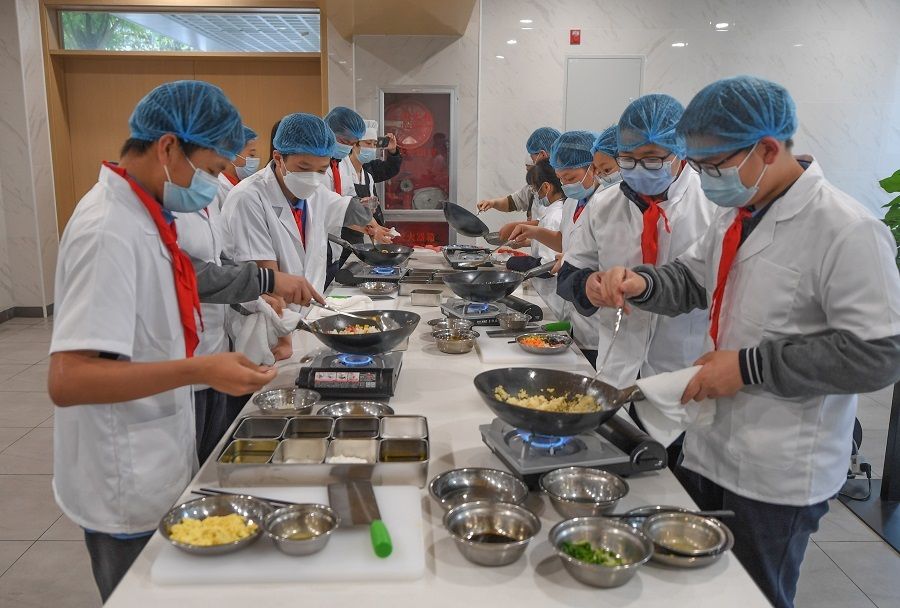
Seventh to ninth graders will learn to design daily meal plans with three recipes a day based on the needs of their family and the nutritional value of the meals. They will learn to prepare three to four lunch or dinner dishes; understand the relationship between nutrition and physical health; increase their understanding of Chinese food culture; and develop respect for workers in the catering industry.
While students are not expected to prepare mouthwatering dishes, objectively speaking, it is no mean feat to prepare three to four nutritious meals and understand the science of eating as well as food culture as a young teenager.
Mixed reactions from parents
Reactions flooded the internet with some netizens commenting wryly, "Next time, parents who adhere to the 996 working hour system need not worry about the hungry children waiting for them at home anymore. They can even save on food delivery fees!"
Another netizen said, "My mother cooked for me during the first half of my life and now my son will cook for me for the latter half. Never have I thought that we post-80s generation will have such a good life. I'm excited!"
Some netizens even started thinking about how this would be a good chance for the tutoring industry to make a comeback, saying, "New Oriental can offer culinary classes now!"
Undoubtedly, the bulk of the comments came from concerned parents. Some of them had rather extreme attitudes towards the "cooking and nutrition" task group.
On the other hand, those supportive of the new curriculum felt that cooking skills would equip their children with life skills from a young age.
One such parent wrote, "I agree on all counts! I think that cooking is not just a life skill but can also make one happy in life. It can provide a sense of security and control, and also teach children to be grateful and cherish what they have."
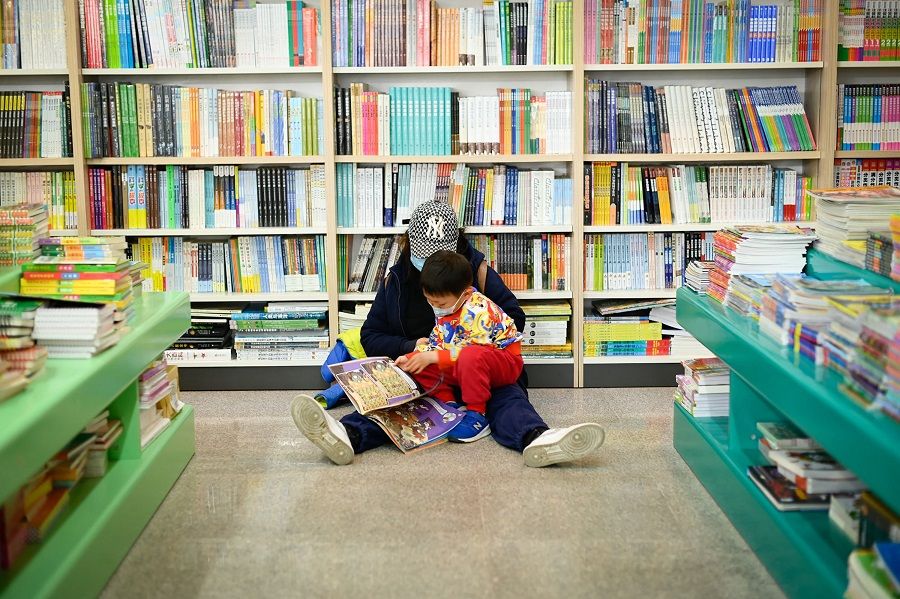
However, many people have expressed their doubts about the new curriculum as they feel it would be difficult to implement and end up as an added burden for the parents.
"Please let our children cook, farm or clear out dung - anything at all - in school. Please do not let them do it at home or make them film a video of the process. These tasks would eventually become the parent's work." - Chinese parent
Some netizens said that the cooking course might be more suitable for universities. Due to the challenges in implementing it in primary and secondary schools, it might end up only being executed perfunctorily.
Meanwhile, many parents are worried that they would have to do the work for their children at the end of the day, which will add to their burden. They lamented, "Please let our children cook, farm or clear out dung - anything at all - in school. Please do not let them do it at home or make them film a video of the process. These tasks would eventually become the parent's work."
Yet another parent commented, "I can only say that another day of doom has come for us parents. Take care! Please remember to keep your temper in check."
Some are even worried that as soon as parents are roped in to implement the new curriculum, labour classes would slip into "involution". A netizen asked, "In the end, would it be the case where the teacher assigns a task but expects parents to teach their children and upload a video? Could the simple task of cooking scrambled egg with tomatoes turn into a competition over who makes the best crayfish dish, Wensi tofu (文思豆腐, boiled and dried beancurd) or Buddha Jumps Over the Wall?"
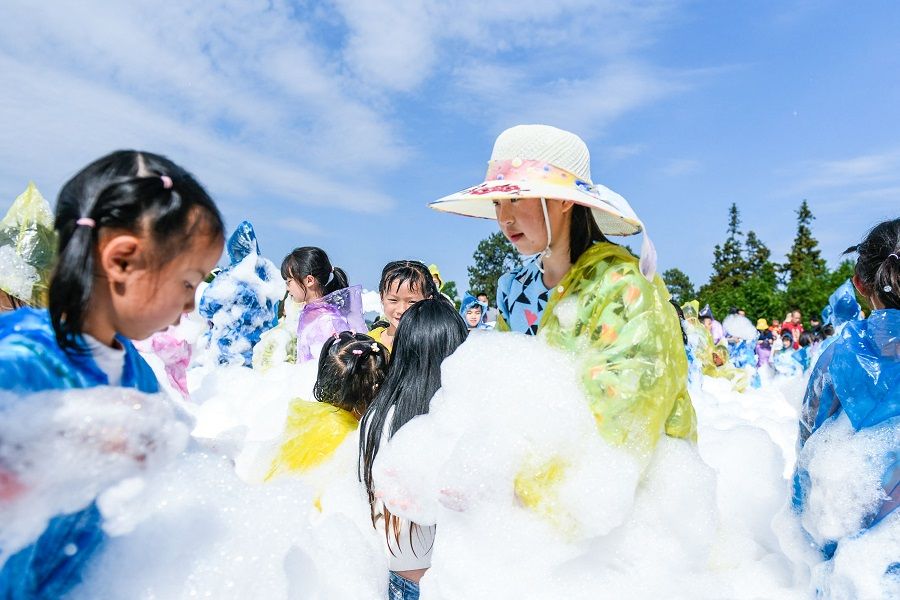
These concerns are not unfounded. The curriculum standards suggest that the classes should be "implemented as a partnership between the school and the family" - schools that are well-resourced may allow students to practise in school, otherwise, students can learn to do so under the guidance of their parents. Furthermore, family members are asked to comment on their children's work.
In sum, it is almost impossible for parents to be uninvolved.
Chen, a mother from Beijing, told Zaobao that she supports the idea of letting her daughter learn to cook when she starts attending primary school in two years. She believes that children need to learn basic self-care skills to truly grow, and those who do not work their limbs or know how to distinguish between grains are ill-equipped to face society.
In response to parents' concerns, she said, "I think most parents simply do not want to go through the trouble. Objectively, Chinese parents are really tired and busy all the time and do not have enough time and patience to educate their children. They just hope that their children will finish their homework sooner, cultivate good habits quicker and complete everything as soon as possible so that the parents can rest!"
Can comprehensive labour classes be implemented?
Chinese primary and secondary schools had previously offered labour classes, but these were not taken seriously. Eastday.com (东方网) summarised, "Making brooms, learning the art of paper-cutting, sweeping the field, clearing coal cinder... these are all labour classes of the past. They are purely low-skilled manual work with simple course descriptions. Thus, schools did not pay much attention to them and often replaced them with other lessons or reduced them to a spring cleaning activity with limited appeal to students."
Indeed, this "return" of labour classes has a more comprehensive curriculum and more specific assessment methods.
Primary and secondary schools in the US, Germany, Finland and Japan also offer similar courses in the form of "home economics" and "crafts" classes. Of course, there is no basis for strong comparison between China and these countries as the education system, society and culture are different.
As the additional labour classes will have to be juggled on top of the existing academic burden, will the new curriculum simply scratch the surface and be skimmed through as feared by some netizens?
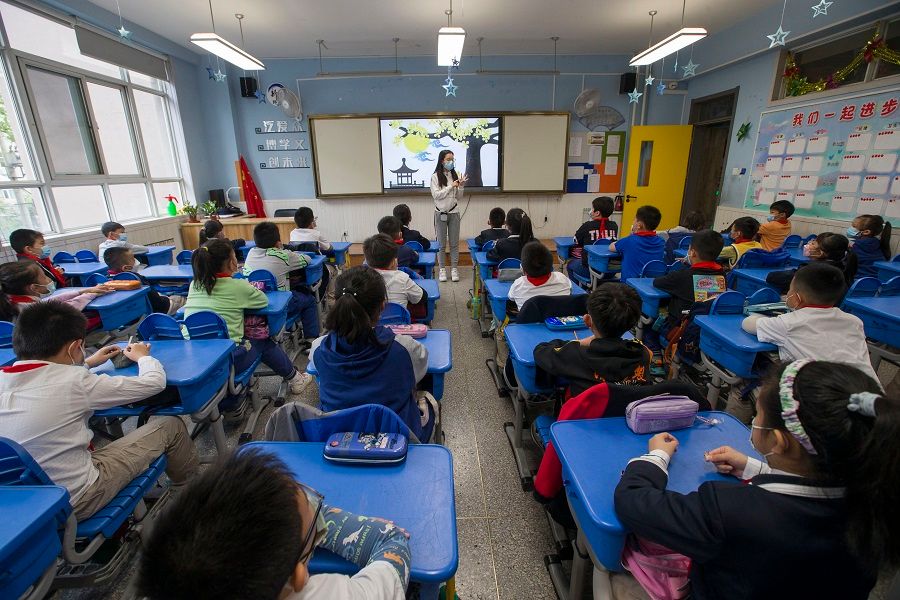
In China's context, children will have to meet the requirements of labour classes on top of managing their existing workloads. No wonder people are worried that this would turn into an added burden for both children and parents. "Cooking and nutrition" is already a difficult task, not to mention the other demanding task groups that are conducted simultaneously.
For example, under the "new technology" task group, secondary school students are required to learn and apply one or two new technologies of their choice, such as 3D printing, laser cutting, smart control technology, computerised numerical control machining, or liquid metal 3D printing.
Under the "using and maintaining household appliances" task group, primary school students are required to understand the functions and master the basic operations of common household appliances such as the television, refrigerator, washing machine, electric fan and air conditioner by reading the instruction manual.
As the additional labour classes will have to be juggled on top of the existing academic burden, will the new curriculum simply scratch the surface and be skimmed through as feared by some netizens?
"Is this all part of a bigger plan to teach the children to take care of themselves so that parents have the energy to have their second or third child?" - Chinese netizen
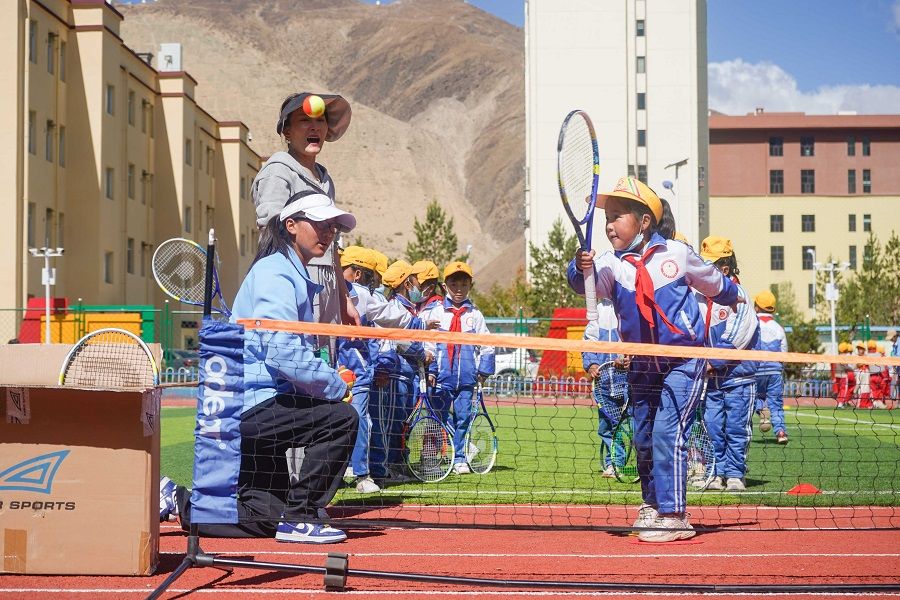
Additionally, it is difficult for schools with varying resources and families with different backgrounds to satisfy all requirements. What happens to the children who are unable to complete their tasks because they do not have the resources to do so? These questions may only be answered when the new semester begins in September.
While the new curriculum has the right intention to cultivate good labour qualities in primary and secondary school students from a young age, it ultimately depends on whether the labour classes can be properly implemented and whether the relevant requirements are realistic.
As for why the change is happening now, some netizens wonder if it has anything to do with boosting China's birth rate. One said, "Is this all part of a bigger plan to teach the children to take care of themselves so that parents have the energy to have their second or third child?"
Another commented, "Taking it one step further, is it all aimed at teaching the older siblings to take care of their younger siblings so as to lessen the burden on their parents?"
While these are mere speculations, if labour classes were to make parents who are already stressed even busier, more tired and more troubled, will they even consider having another child?
Related: Tuition lessons as cheap as 'cabbage', but Chinese parents and teachers are unhappy | Parents and teachers brace themselves for China's new school year under the 'double reduction' policy | Destroying independent thinkers: Why China's tutoring industry needs strong intervention | China's tutoring industry finding new ways to survive after government crackdown | A Chinese education: Why are Chinese parents and kids going to extremes?
